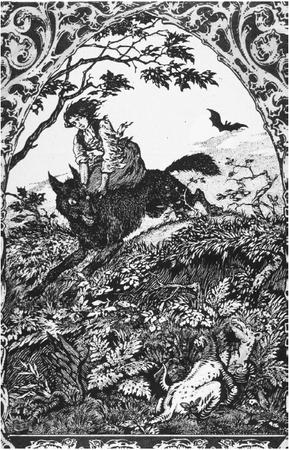Superstitions
Dogs
Dogs, "man's best friend," do not have any of the kind of sinister superstitions that surround the cat, their domesticated companion and

To the Native American tribes, as well as to all aboriginal people throughout Europe, Asia, and the Americas, the wolf was the great teacher, and the social structure of early humans was largely patterned after the examples set by their canine instructors. Although among the vast majority of mammals the care of the young is left solely to the mother, human tribes soon adopted the cooperative rearing strategy employed by the wolf, with both parents participating in the rearing process.
According to the legends of several Native American tribes, the first humans were created in the shape of wolves. At first these wolf people walked on all fours; then, slowly, began to develop more human characteristics until they became men and women.
Among the superstitions associated with the dog is the ancient belief that the howling of dogs portends death and calamities. This appears to be a relic of the time when humans made deities of animals, and as a deity, the dog was supposed to be able to foresee death and give warning of it by howling or barking. This superstition became perpetuated among the Egyptians, who depicted the god that presided over the embalming of the dead as Anubis, the jackal-headed deity. It was also Anubis's task to lead the spirits of the deceased to the hall of judgment.
Among many Native American tribes, it is the dog who awaits the spirit of the newly deceased on the Way of Departed Spirits and who accompanies the entity to the Land of the Grandparents. In addition to its role as a guide to the other side, a number of tribes associated the dog with the moon and the sun. Such an association with the moon may have stemmed from the dog's howling at the moon on shadowy nights. The connection with the sun may derive from the dog's habit of walking around in a small circle before it lies down. To early people, the making of such a circle was to create a symbol of the sun.
In ancient Persia, dogs were believed to be able to protect the dying soul from possession by evil spirits. When a person was dying, a dog was stationed by the bedside to keep away the negative spirits that hovered near newly released souls.
The Greeks believed that dogs had the ability to perceive the presence of Hecate, the goddess of darkness and terror. While this malign entity remained invisible to human eyes and was thus able to work her evil undetected, dogs were able to see her and warn their human companions by barking and growling at her unseen presence in darkened corners.
There is an old superstition that good luck will be granted to a person who is followed by a stray dog. If the dog should follow someone on a rainy night, however, such action brings bad luck.

Comment about this article, ask questions, or add new information about this topic: